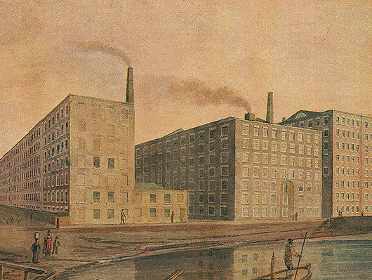Industrial Revolution in Europe

Spread of the Industrial Revolution from Great Britain
The Industrial Revolution was a major turning point in history as the transition from agrarian and manual labor-based economy to machine-based production fundamentally transformed economic, social, cultural and political life throughout Europe and eventually the rest of the world. The unprecedented economic change started to spread from Great Britain to Continental Europe in the 19th century. The pace of industrialization, however, varied greatly from one country to another, while Britain retained its economic superiority until the outbreak of World War 1 in 1914.
Reasons for the Start of the Industrial Revolution in Britain
Multiple factors played an important role in the emergence of Great Britain as the birthplace of the Industrial Revolution and its economic superiority. The country had an abundance of high quality coal which was suitable for iron production and enjoyed political stability and peace since the late 17th century that made the British society ready for a change. Britain also experienced a major population growth in the 17th and 18th centuries which provided the needed labor force as well as increased the demand for manufactured goods.
Influence of the British Overseas Colonies on the Industrialization Process in Britain
As the leading imperial power, Britain benefited from the access to cheap raw materials in its overseas colonies and had major profits from the African slave trade. However, profits from the overseas colonies alone do not explain Industrial Revolution in Britain because the Spanish Empire benefited from its colonies as well but it remained far behind the British industry. Readiness of the British manufacturers to implement innovative technology and their ability to take advantage of the opportunities of the 18th century global economy seem to have played a much more important role than the direct financial benefits from colonies.
Attitude of the European Governments towards Industrial Development
The British society in the 18th century was aristocratic, however, the British aristocracy supported commerce and manufacturing at the same time when non-agricultural activities were despised by the land owning upper classes elsewhere in Europe. Even more, a coalition between Russia, Austria and Prussia known as the Holy Alliance was formed at the Congress of Vienna in 1815 which amongst other sought to defend the old social order that rejected liberal economic ideas and socio-political modernization. The conservative governments in Continental Europe hindered rather than supported industrial development out of fear of revolution, while the bourgeoisie lacked both the capital and influence of their British counterparts.
Impact of the French Revolutionary Wars and Continental Blockade on the European Economy
The Industrial Revolution in Continental Europe started later also due to the turmoils of the French Revolution and the French Revolutionary Wars (1792-1815). The Continental Blockade, imposed by Napoleon against the United Kingdom eliminated the British competition in Continental Europe but it also blocked the import of modern British machines. Napoleon’s plan to destroy the British economy failed because the British manufacturers established themselves in new markets and Britain even strengthened its position as the leading economic power by the end of the French Revolutionary Wars.
Industrial Revolution in Belgium, France and Germany
Belgium was the second industrialized country after Britain and is often referred to as the birthplace of Industrial Revolution in Continental Europe. The country largely adopted the British model and like the British industry, the Belgian industry based on coal, iron and textiles. In the mid-19th century, France established itself as the second industrial power in Europe but it could not compete with the British economy. After the defeat in the Franco-Prussian War (1870-1871), the French economy started to lag behind. The French defeat, however, enabled Germany to increase its industrial production and establish itself as a serious rival to the British industry by the early 20th century.
Industrial Revolution in Russia, Austria-Hungary and Italy
Other European countries, especially Russia lagged far behind and were mostly rural at the turn of the 19th century. Serfdom in Russia was abolished only in 1861 and it was not until the Stalin’s five-year plans in the 1930’s that transformed the country into an industrial power. Austria-Hungary abolished serfdom late as well and the industrial expansion started only in the second half of the 19th century. The Dual Monarchy experienced a considerable economic growth in the late 19th century but it lagged far behind Britain and Germany. In addition, industrialization in Austria-Hungary was marked by major disparities between different parts of the country. Similar process also took place in Italy which was divided into industrialized north and mostly rural south.




